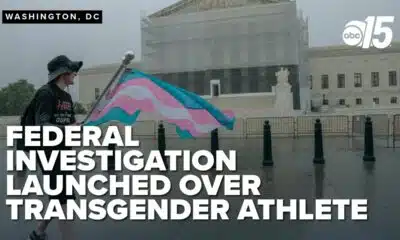Mississippi Today
Eli Manning heads Class of 2024 slated for Mississippi Sports Hall of Fame induction


Two-time Super Bowl MVP Eli Manning, a consensus All-American quarterback at Ole Miss, heads a diverse list of eight former athletes and sports figures selected for induction into the Mississippi Sports Hall of Fame in August of 2024.
The Class of ’24 was announced at a press conference Wednesday afternoon at the MSHOF Museum, which will begin undergoing a $4 million renovation immediately.
Other 2024 inductees, in alphabetical order, include: Walter “Red” Barber, Baseball Hall of Fame broadcaster; Madison-Ridgeland Academy basketball coach Richard Duease, who has coached the second most basketball victories of any high school basketball coach in the U.S.; Laurel fisherman Paul Elias, 1982 Bassmasters Classic champion, and winner of five other national pro tournaments; former Jackson State and NFL wide receiver Jimmy Smith, a five-time Pro Bowler and the Jacksonville Jaguars’ all-time leading receiver; Jackson native Savante Stringellow, a former world champion long jumper who prepped at Provine and was an All American at Ole Miss; tennis champion Becky Vest, another Jackson Provine product, who competed on the Virginia Slims Tour, at Wimbledon, and the U.S. and French Opens; and Florence’s Jimmy Webb, a Mississippi State All American defensive lineman and first-round NFL Draft choice who played seven years of pro football in San Francisco and San Diego.
Brief bios of each follow:
- Red Barber was born in Columbus, where he lived his first 10 years. His family left the state but his rich, Southern accent stayed with him throughout his Hall of Fame broadcasting career. He broke into Major League Baseball with the Cincinnati Reds and later famously broadcast the games of the Brooklyn Dodgers and New York Yankees. He and Mel Allen were the first two broadcasters inducted into the National Baseball Hall of Fame at Cooperstown.
- Richard Duease, born and raised Indianola, attended Mississippi State where he first majored in business, planning to eventually run his family’s two department stores in the Delta. Instead, he went into coaching. That was 48 years, 1,801 victories and 33 state championships ago. “I can’t think of a greater honor than being inducted into the Mississippi Sports Hall of Fame,” Duease said Wednesday.
- Paul Elias said he was too small to play football, was “pretty good” at baseball but “was really, really good” at fishing while growing up in Laurel. “I praise the Lord every day for allowing me to make a good living doing what I love to do,” Elias, a Southern Miss graduate, said. He turned pro in 1979 and won the Bassmasters Classic in Montgomery in 1982. Twenty-six years later, he seta record that still stands for the largest four-da five-bass limit of 132 pounds, 8 ounces in a tournament at Lake Falcon in Texas.
- Eli Manning follows his father, Archie, into the MSHOF, just as he followed him to Ole Miss. During his time at Oxford, he set or tied 47 records to become the most honored offensive player in school history. He was the first player selected in the 2004 NFL Draft and played 16 years for the New York Giants. His jersey No. 10 has been retired by both Ole Miss and the Giants. In 2016, he was chosen winner of the NFL’s Walter Payton Man of the Year Award, named after another Mississippi Sports Hall of Famer. Manning will enter the MSHOF in his first year of eligibility for the honor.
- Jimmy Smith earned his nickname “Silk” at Callaway High School for how he made so many big plays so gracefully and with seemingly little effort. He then starred at Jackson State and began his professional career as a second round draft choice of the Dallas Cowboys. But he became one of the game’s most productive receivers with the Jacksonville Jaguars for whom he caught 862 passes, including 67 for touchdowns. He is in the Jaguars’ Ring of Honor but considers Wednesday’s announcement “my greatest honor, something I have wanted for a long, long time.”
- Savanté Stringfellow played basketball and ran track at Provine, where he caught the eye of MSHOF track coach Joe Walker, then the coach at Ole Miss. He claimed three NCAA Championships as a Rebel All American became a U.S Olympian and follows in a long line of so many remarkable Mississippi long jumpers, including Hall of Famers Ralph Boston, Larry Myricks, Brittney Reese and Willye B. White. “I don’t know what it is about Mississippi and the long jump, but I’m just glad to be a part of it,” said Stringfellow, whose son, Kennedy, is a promising freshman long jumper at Mississippi State.
- Becky Vest, another Jackson native and Provine grad, won five high school state tennis championships, two while still in junior high. She played collegiately at Trinity (Texas) University where she was a national champion. After college, she competed internationally as a professional and has become an acclaimed teacher. She follows her mother, Dorothy Vest, as the first mother/daughter combo in the Mississippi Sports Hall of Fame.
- Jimmy Webb of Florence became one of the greatest defensive players in Mississippi State football history, a consensus All American in the early-to -mid 1970s. A first round draft choice, he also starred in the NFL with both the San Francisco 49ers and San Diego Chargers. At State, he studied veterinary medicine, preparing for his post-football career as a veterinarian and a cattle rancher. “I have been so blessed,” Webb said. “I appreciate this state so much and am so thankful for his honor. At my age, the honors don’t seem to come around that much any more.”
The Class of ’24 will be inducted the weekend Aug. 2-3 in Jackson. Tickets will go on sale in January.
This article first appeared on Mississippi Today and is republished here under a Creative Commons license.
Mississippi Today
Trump nominates Baxter Kruger, Scott Leary for Mississippi U.S. attorney posts
President Donald Trump on Tuesday nominated Baxter Kruger to become Mississippi’s new U.S. attorney in the Southern District and Scott Leary to become U.S. attorney for the Northern District.
The two nominations will head to the U.S. Senate for consideration. If confirmed, the two will oversee federal criminal prosecutions and investigations in the state.
Kruger graduated from the Mississippi College School of Law in 2015 and was previously an assistant U.S. attorney for the Southern District. He is currently the director of the Mississippi Office of Homeland Security.
Sean Tindell, the Mississippi Department of Public Safety commissioner, oversees the state’s Homeland Security Office. He congratulated Kruger on social media and praised his leadership at the agency.
“Thank you for your outstanding leadership at the Mississippi Office of Homeland Security and for your dedicated service to our state,” Tindell wrote. “Your hard work and commitment have not gone unnoticed and this nomination is a testament to that!”
Leary graduated from the University of Mississippi School of Law, and he has been a federal prosecutor for most of his career.
He worked for the U.S. Attorney’s Office in the Western District of Tennessee in Memphis from 2002 to 2008. Afterward, he worked at the U.S. Attorney’s Office for the Northern District of Mississippi in Oxford, where he is currently employed.
Leary told Mississippi Today that he is honored to be nominated for the position, and he looks forward to the Senate confirmation process.
This article first appeared on Mississippi Today and is republished here under a Creative Commons Attribution-NoDerivatives 4.0 International License.
The post Trump nominates Baxter Kruger, Scott Leary for Mississippi U.S. attorney posts appeared first on mississippitoday.org
Note: The following A.I. based commentary is not part of the original article, reproduced above, but is offered in the hopes that it will promote greater media literacy and critical thinking, by making any potential bias more visible to the reader –Staff Editor.
Political Bias Rating: Centrist
This article presents a straightforward news report on President Donald Trump’s nominations of Baxter Kruger and Scott Leary for U.S. attorney positions in Mississippi. It focuses on factual details about their backgrounds, qualifications, and official responses without employing loaded language or framing that favors a particular ideological perspective. The tone is neutral, with quotes and descriptions that serve to inform rather than persuade. While it reports on a political appointment by a Republican president, the coverage remains balanced and refrains from editorializing, thus adhering to neutral, factual reporting.
Mississippi Today
Jackson’s performing arts venue Thalia Mara Hall is now open
After more than 10 months closed due to mold, asbestos and issues with the air conditioning system, Thalia Mara Hall has officially reopened.
Outgoing Mayor Chokwe A. Lumumba announced the reopening of Thalia Mara Hall during his final press conference held Monday on the arts venue’s steps.
“Today marks what we view as a full circle moment, rejoicing in the iconic space where community has come together for decades in the city of Jackson,” Lumumba said. “Thalia Mara has always been more than a venue. It has been a gathering place for people in the city of Jackson. From its first class ballet performances to gospel concerts, Thalia Mara Hall has been the backdrop for our city’s rich cultural history.”
Thalia Mara Hall closed last August after mold was found in parts of the building. The issues compounded from there, with malfunctioning HVAC systems and asbestos remediation. On June 6, the Mississippi State Fire Marshal’s Office announced that Thalia Mara Hall had finally passed inspection.
“We’re not only excited to have overcome many of the challenges that led to it being shuttered for a period of time,” Lumumba said. “We are hopeful for the future of this auditorium, that it may be able to provide a more up-to-date experience for residents, inviting shows that people are able to see across the world, bringing them here to Jackson. So this is an investment in the future.”
In total, Emad Al-Turk, a city contracted engineer and owner of Al-Turk Planning, estimates that $5 million in city and state funds went into bringing Thalia Mara Hall up to code.
The venue still has work to be completed, including reinstalling the fire curtain. The beam in which the fire curtain will be anchored has asbestos in it, so it will have to be remediated. In addition, a second air-conditioning chiller needs to be installed to properly cool the building. Until it’s installed, which could take months, Thalia Mara Hall will be operating at a lower seating capacity of about 800.
“Primarily because of the heat,” Al-Turk said. “The air conditioning would not be sufficient to actually accommodate the 2,000 people at full capacity, but starting in the fall, that should not be a problem.”
Al-Turk said the calendar is open for the city to begin booking events, though none have been scheduled for July.
“We’re very proud,” he said. “This took a little bit longer than what we anticipated, but we had probably seven or eight different contractors we had to coordinate with and all of them did a superb job to get us where we are today.”
This article first appeared on Mississippi Today and is republished here under a Creative Commons Attribution-NoDerivatives 4.0 International License.
The post Jackson’s performing arts venue Thalia Mara Hall is now open appeared first on mississippitoday.org
Note: The following A.I. based commentary is not part of the original article, reproduced above, but is offered in the hopes that it will promote greater media literacy and critical thinking, by making any potential bias more visible to the reader –Staff Editor.
Political Bias Rating: Centrist
The article presents a straightforward report on the reopening of Thalia Mara Hall in Jackson, focusing on facts and statements from city officials without promoting any ideological viewpoint. The tone is neutral and positive, emphasizing the community and cultural significance of the venue while detailing the challenges overcome during renovations. The coverage centers on public investment and future prospects, without partisan framing or editorializing. While quotes from Mayor Lumumba and a city engineer highlight optimism and civic pride, the article maintains balanced, factual reporting rather than advancing a political agenda.
Mississippi Today
‘Hurdles waiting in the shadows’: Lumumba reflects on challenges and triumphs on final day as Jackson mayor
On his last day as mayor of Jackson, Chokwe Antar Lumumba recounted accomplishments, praised his executive team and said he has no plans to seek office again.
He spoke during a press conference outside of the city’s Thalia Mara Hall, which was recently cleared for reopening after nearly a year of remediation. The briefing, meant to give media members a peek inside the downtown theater, marked one of Lumumba’s final forays as mayor.
Longtime state Sen. John Horhn — who defeated Lumumba in the Democratic primary runoff — will be inaugurated as mayor Tuesday, but Lumumba won’t be present. Not for any contentious reason, the 42-year-old mayor noted, but because he returns to his private law practice Tuesday.
“I’ve got to work now, y’all,” Lumumba said. “I’ve got a job.”
Thalia Mara Hall’s presumptive comeback was a fitting end for Lumumba, who pledged to make Jackson the most radical city in America but instead spent much of his eight years in office parrying one emergency after another. The auditorium was built in 1968 and closed nearly 11 months ago after workers found mold caused by a faulty HVAC system – on top of broken elevators, fire safety concerns and vandalism.
“This job is a fast-pitched sport,” Lumumba said. “There’s an abundance of challenges that have to be addressed, and it seems like the moment that you’ve gotten over one hurdle, there’s another one that is waiting in the shadows.”
Outside the theater Monday, Lumumba reflected on the high points of his leadership instead of the many crises — some seemingly self-inflicted — he faced as mayor.
He presided over the city during the coronavirus pandemic and the rise in crime it brought, but also the one-two punch of the 2021 and 2022 water crises, exacerbated by the city’s mismanagement of its water plants, and the 18-day pause in trash pickup spurred by Lumumba’s contentious negotiations with the city council in 2023.
Then in 2024, Lumumba was indicted alongside other city and county officials in a sweeping federal corruption probe targeting the proposed development of a hotel across from the city’s convention center, a project that has remained stalled in a 20-year saga of failed bids and political consternation.
Slated for trial next year, Lumumba has repeatedly maintained his innocence.
The city’s youngest mayor also brought some victories to Jackson, particularly in his first year in office. In 2017, he ended a furlough of city employees and worked with then-Gov. Phil Bryant to avoid a state takeover of Jackson Public Schools. In 2019, the city successfully sued German engineering firm Siemens and its local contractors for $89 million over botched work installing the city’s water-sewer billing infrastructure.
“I think that that was a pivotal moment to say that this city is going to hold people responsible for the work that they do,” Lumumba said.
Lumumba had more time than any other mayor to usher in the 1% sales tax, which residents approved in 2014 to fund infrastructure improvements.
“We paved 144 streets,” he said. “There are residents that still are waiting on their roads to be repaved. And you don’t really feel it until it’s your street that gets repaved, but that is a significant undertaking.”
And under his administration, crime has fallen dramatically recently, with homicides cut by a third and shootings cut in half in the last year.
Lumumba was first elected in 2017 after defeating Tony Yarber, a business-friendly mayor who faced his own scandals as mayor. A criminal justice attorney, Lumumba said he never planned to seek office until the stunning death of his father, Chokwe Lumumba Sr., eight months into his first term as mayor in 2014.
“I can say without reservation, and unequivocally, we remember where we started. We are in a much better position than we started,” Lumumba said.
Lumumba said he has sat down with Horhn in recent months, answered questions “as extensively as I could,” and promised to remain reachable to the new mayor.
This article first appeared on Mississippi Today and is republished here under a Creative Commons Attribution-NoDerivatives 4.0 International License.
The post 'Hurdles waiting in the shadows': Lumumba reflects on challenges and triumphs on final day as Jackson mayor appeared first on mississippitoday.org
Note: The following A.I. based commentary is not part of the original article, reproduced above, but is offered in the hopes that it will promote greater media literacy and critical thinking, by making any potential bias more visible to the reader –Staff Editor.
Political Bias Rating: Center-Left
The article reports on outgoing Jackson Mayor Chokwe Antar Lumumba’s reflections without overt editorializing but subtly frames his tenure within progressive contexts, emphasizing his self-described goal to make Jackson “the most radical city in America.” The piece highlights his accomplishments alongside challenges, including public crises and a federal indictment, maintaining a factual tone yet noting contentious moments like labor disputes and governance issues. While it avoids partisan rhetoric, the focus on social justice efforts, infrastructure investment, and crime reduction, as well as positive framing of Lumumba’s achievements, aligns with a center-left perspective that values progressive governance and accountability.
-
News from the South - Georgia News Feed7 days ago
Are you addicted to ‘fridge cigarettes’? Here’s what the Gen Z term means
-
News from the South - Oklahoma News Feed7 days ago
RFK Jr. Brings MAHA to Oklahoma
-
News from the South - South Carolina News Feed6 days ago
Federal investigation launched into Minnesota after transgender athlete leads team to championship
-
News from the South - Florida News Feed7 days ago
US Supreme Court allows SC to remove Planned Parenthood from list of Medicaid providers
-
The Center Square5 days ago
U.S. Senate prepares for passage of One Big Beautiful Bill Act | National
-
News from the South - Tennessee News Feed6 days ago
Democratic resolution to block military action in Iran fails to advance in US Senate
-
News from the South - Virginia News Feed7 days ago
‘Hallowed ground, desecrated’: ICE sweeps at Chesterfield court draw fierce backlash
-
News from the South - Louisiana News Feed5 days ago
Water company hiked sewage rates in Lafayette to state’s highest


















































